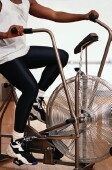- Could Your Grocery Store Meat Be Causing Recurring UTIs?
- Are You Making This Expensive Thermostat Error This Winter?
- Recognizing the Signs of Hypothyroidism
- 10 Strategies to Overcome Insomnia
- Could Artificial Sweeteners Be Aging the Brain Faster?
- Techniques for Soothing Your Nervous System
- Does the Water in Your House Smell Funny? Here’s Why
- Can a Daily Dose of Apple Cider Vinegar Actually Aid Weight Loss?
- 6 Health Beverages That Can Actually Spike Your Blood Sugar
- Treatment Options for Social Anxiety Disorder
Home Exercise Boosts Heart Patients’ Frame of Mind


Exercising at home can reduce feelings of hopelessness in people with coronary heart disease, but in-hospital workouts don’t provide the same benefit, according to a new study.
Hopelessness in heart patients increases the risk of worsening heart disease and death, possibly because those feelings may keep folks from adopting heart-healthy habits such as exercising or quitting smoking, the researchers noted.
Heart patients feeling pessimistic and helpless about the future may also suffer from depression, which makes them lose interest in activities they normally enjoy, according to the researchers.
The new research included more than 300 people, average age 66, with coronary heart disease. One-third of the study volunteers were women, and more than 90 percent were white. Their feelings of hopelessness were first assessed while they were still in the hospital, according to the study. Twenty-four percent of the patients had current feelings of hopelessness, 28 percent had long-term feelings of hopelessness and 30 percent had both types, the study noted.
A year later, those who walked or bicycled at home at least three days a week had a 12 percent reduction in feelings of hopelessness, according to the study.
The findings were presented Tuesday at the American Heart Association (AHA) meeting in Chicago. Studies presented at meetings are considered preliminary until published in a peer-reviewed journal.
The researchers said they were surprised to learn that hospital-based exercise didn’t improve patients’ hopelessness levels. They suggested that the initiative required to exercise at home may have boosted patients’ sense of having control over their health.
“For the first time, we show the beneficial effect of exercise in helping patients to feel more hopeful. With home exercise, patients are likely thinking more positively about the future and feeling more capable of making positive changes for a healthy lifestyle,” study lead author Susan Dunn, a professor of nursing at Hope College in Holland, Mich., said in an AHA news release.
“All patients should be encouraged to participate in a regular exercise program,” she said. “Special encouragement is needed for patients who are moderately to severely hopeless, as they may be the most vulnerable and the least likely to exercise, yet benefit the most.”
More information
The U.S. National Heart, Lung, and Blood Institute has more about coronary heart disease.
Source: HealthDay
Copyright © 2026 HealthDay. All rights reserved.










